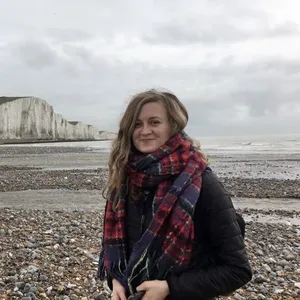NATIONAL MUSEUM OF NATURAL HISTORY
Seven Natural History Programs to Stream for Free in October
Stream these programs and more through the Smithsonian’s National Museum of Natural History
:focal(715x538:716x539)/https://tf-cmsv2-smithsonianmag-media.s3.amazonaws.com/filer_public/98/80/9880adc8-e92e-4e21-889f-1f3184c72d53/person_using_a_notebook_while_kneeling_in_grass_on_a_sunny_day.jpg)
A virtual visit to a field site in Kenya; a discussion on whether humans are naturally violent or peaceful; and a chance to create drawings inspired by ancient art; stream these free programs and more this October through the Smithsonian's National Museum of Natural History.
PolliNation DC
Ongoing through Oct. 31
/https://tf-cmsv2-smithsonianmag-media.s3.amazonaws.com/filer_public/29/d7/29d7b90f-dc62-48ac-be52-14118bb543b0/collage_of_eight_different_insects_pollinating_flowers.png)
Help pollinators by joining PolliNation DC, a community science project led by ecologists at the museum and the University of the District of Columbia’s Center for Sustainable Development and Resilience, to document the animals that are pollinating edible plants in community gardens throughout Washington, D.C. and on the National Mall.
It’s easy to participate. Join the project on iNaturalist, snap photos of insects and the flowers they land on and upload them for identification. Your participation will not only help scientists record the diversity of insects that pollinate gardens in the nation’s capital, but also aid local gardeners who are growing plants for food.
Understanding What it Means to Be Human and Animal
Oct. 13, 5 p.m. ET
/https://tf-cmsv2-smithsonianmag-media.s3.amazonaws.com/filer_public/12/91/12915321-0a0b-448c-9005-4c168994b562/headshot_of_melanie_challenger_looking_off_into_the_distance_with_trees_in_the_background.jpg)
In her recent book “How to Be Animal: A New History of What It Means to Be Human,” environmental philosopher Melanie Challenger explores why humans struggle to understand themselves as animals. Blending history, philosophy and nature writing, Challenger examines how humans have wrestled with their animality since the origin of Homo sapiens.
In this program for adults, Challenger will discuss how our animal nature affects our lives with Smithsonian paleoanthropologist and educator Briana Pobiner.
Exploring the Art of Ancient Humans
Oct. 16, 11 a.m. ET
/https://tf-cmsv2-smithsonianmag-media.s3.amazonaws.com/filer_public/75/25/75250de5-8244-47fc-8299-6415b49d99cb/illustration_of_an_early_human_blowing_through_bone_to_paint_a_handprint_on_a_cave_wall.jpg)
For thousands of years ancient humans have created art to connect with and make sense of the natural world around them. Join paleoanthropologist Briana Pobiner for an exploration of artifacts from the museum and around the world, and learn about how art and imagination have long been part of the human story.
All ages are invited to this virtual event, which will be presented in English with ASL interpretation. It’s part of the Natural History at Home series and the 2021 Archaeology Family Weekend on Oct. 16 and 17. Have a pencil, paper and markers, crayons or paint ready at the start of the program to create your own works of art inspired by ancient artifacts.
Mixtec and Mayan Language Past, Present and Future
Oct. 17, 2 p.m. ET
/https://tf-cmsv2-smithsonianmag-media.s3.amazonaws.com/filer_public/c8/66/c866b8d7-f9ef-432c-a20c-728ba8c8397b/two_folding_pages_of_pre-columbian_mixtec_pictography_from_the_codex_zouche-nuttall.jpg)
Learn about how essential language is to cultures throughout history by exploring how Mayan and Mixtec languages have been passed down through generations. Language researchers Omar Aguilar and Genner Llanes Ortiz will guide families through ancient codices and books to discover more about how symbols and images have been used to communicate from the ancient past to today.
This program is for families and will be presented in Spanish and English. It’s part of the Natural History at Home series and the 2021 Archaeology Family Weekend on Oct. 16 and 17.
The Evolution of Human Warfare and Peace
Oct. 21, 11:30 p.m. ET
/https://tf-cmsv2-smithsonianmag-media.s3.amazonaws.com/filer_public/27/0d/270d8b5a-093d-46bc-8f79-b3eccdf610b5/sculpture_of_a_dark_giant_revolver_with_its_barrel_knotted_on_display_in_a_city.jpg)
Are humans predisposed towards violence and aggression? And what role does peace and compassion play in our origins?
Marc Kissel, associate professor of anthropology at Appalachian State University, will share his research on compassion and violence in a discussion moderated by Smithsonian paleoanthropologist and educator Briana Pobiner.
This program is for adults. It’s offered as part of the Human Origins Today (HOT) Topics series, which covers scientific discoveries as well as topics of broader interest centered on what it means to be human.
Feral Landscapes: Ecosystems in a Concrete Jungle
Oct. 27, 5 p.m. ET
/https://tf-cmsv2-smithsonianmag-media.s3.amazonaws.com/filer_public/f7/46/f746b501-8064-4695-9b59-0732276d8cac/fenced_off_but_empty_city_block_overgrown_with_weeds_bushes_and_other_wild_plants.jpg)
In the concrete jungle of Brooklyn, New York, interdisciplinary artist Ellie Irons makes watercolor paints from invasive weeds that sprout between sidewalk panels. She also photographs cycles of growth, maintenance, decay and development in the urban ecosystem. In her Feral Landscape Typologies project, Irons tracks the dwindling vacant spaces of Bushwick, Brooklyn, capturing how these seemingly empty spaces are actually full of many things.
Join Irons in this program for adults as she presents an overview of the Feral Landscape Typologies project in a conversation with Stella Tarnay, co-founder and executive director of Capital Nature, a nonprofit organization that promotes nature engagement in Washington, D.C.
The program is part of a series of discussions with artists featured in the museum’s exhibit “Unsettled Nature: Artists Reflect on the Age of Humans” and will be moderated by exhibit co-curator Scott Wing.
Field Work at Kenya’s Ol Pejeta Conservancy
Oct. 28, 1 p.m. ET
/https://tf-cmsv2-smithsonianmag-media.s3.amazonaws.com/filer_public/31/25/3125c887-e8a1-49f5-94f7-4498af828cf1/scientist_resting_a_bone_vertically_on_the_grass_in_an_open_field_on_a_sunny_day_in_kenya.jpg)
Paleoanthropologist Briana Pobiner studies the evolution of human diets and meat-eating. At Ol Pejeta Conservancy, a wildlife preserve in central Kenya, she searches for bones and fossils to understand what our ancient ancestors ate and about the environments where they lived.
Tag along with Pobiner on a virtual field trip to Ol Pejeta Conservancy in this program designed for students in grades 3-5. She’ll be walking students through what kind of evidence her team is looking for and what it’s like to live, sleep, and eat while doing fieldwork.
This webcast is part of Smithsonian Science How, a web series that delivers real-world science and research into classrooms.
Related stories:
Seven Ways to Learn About Natural History From Home
Sign Your Students Up for a Natural History Crash Course This Fall
Meet the Smithsonian Natural History Museum’s New Head of Education, Outreach and Visitor Experience

